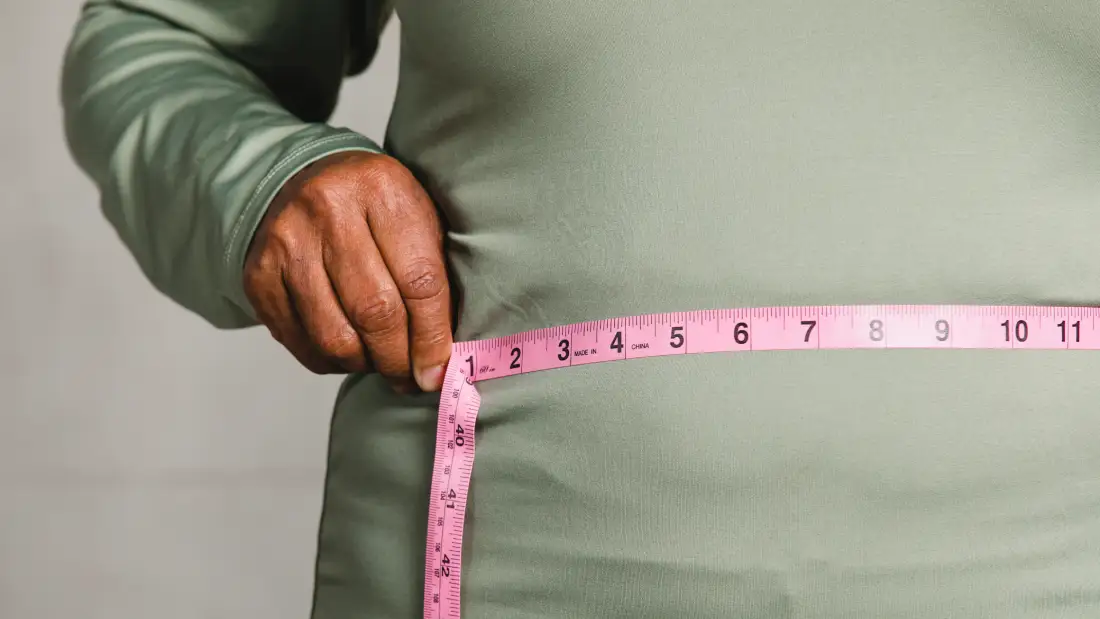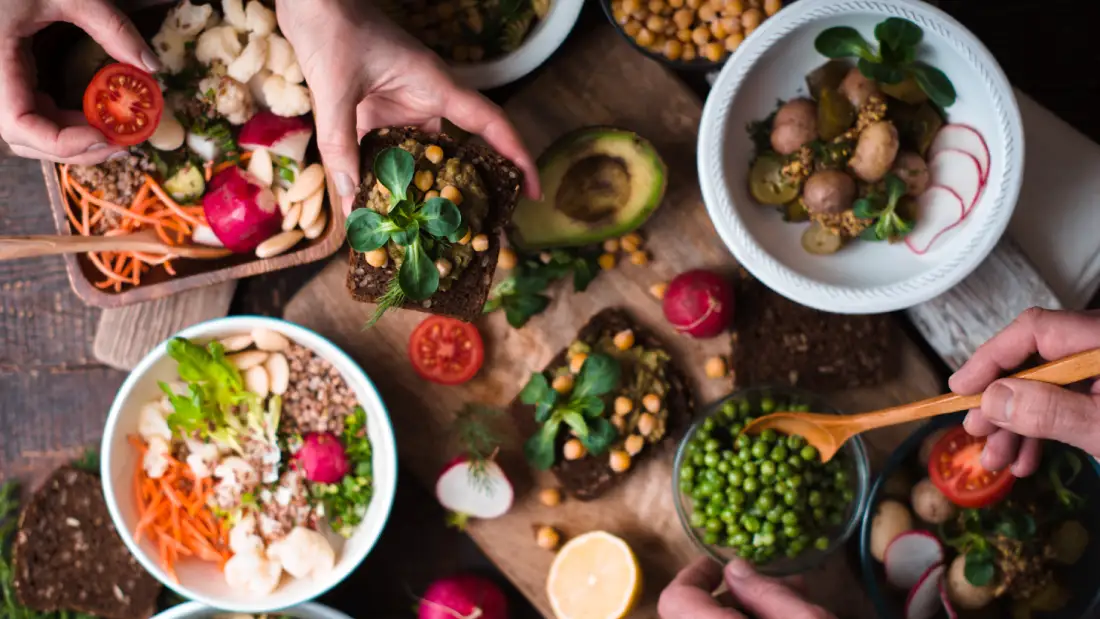10 healthy ways to lose weight and keep it off

We live in an environment that makes it all too easy to make choices that negatively impact our health. Processed animal-based foods are cheap and readily available. It’s easier to take escalators or lifts instead of the stairs. Some cities make it hard to walk so we jump in the car for a short journey. As a result, today, there is an epidemic of obesity, drastically reducing the quality of life for billions of people.
Many people have tried crash diets but the evidence is clear that they don’t work for long-term weight loss. Even going vegan isn’t a guarantee you’ll lose weight – especially if you’re partial to an Oreo… or several. Diet change can have a different impact on each of us, depending on what your diet was like before you changed it, what it looks like now, your metabolism, age, stress levels, gender and genetics.
However, there are ways to lose weight healthily and keep it off. It doesn’t involve a crash diet but instead relies on achievable and sustainable lifestyle change.
1. Eat whole plant foods
First and foremost for anyone looking to lose weight and maintain a healthy body mass index (BMI), you should make sure you are mainly eating whole plant foods. The evidence is clear that those following a plant-based diet tend to have a lower BMI and more successful weight loss than those following a standard Western omnivorous diet. By going wholefood plant-based, you’re cutting out the high-fat animal-based and processed foods and consuming less calorie-dense foods, full of vitamins, minerals and other health-promoting micronutrients.
2. Avoid meat
Meat is high in calories and saturated fat which makes it a big no-no if you are trying to reach and maintain a healthy BMI. Studies have shown that the more meat you eat, the more likely you are to have a high BMI, larger waist circumference and increased likelihood of obesity. Even small amounts can make an impact. Enough said!
3. Focus on the right fats
Meat and most dairy products are high in saturated fat, which has not only been shown to increase the risk of heart disease and stroke, but also increase liver and visceral fat (belly fat surrounding your organs). Having a fatty liver, known as non-alcoholic fatty liver disease, is commonly seen in overweight or people with obesity and is linked to developing type-2 diabetes.
On the other hand, polyunsaturated fat found in foods such as walnuts and flaxseed, can help maintain a healthy BMI. Bear in mind, eating a small amount of polyunsaturated fat is good for you and snacking on a moderate amount of nuts can even help weight control and prevent long-term weight gain, but all fats are calorie-dense so don’t start glugging olive oil!
4. Pump up the protein
It may sound contradictory, but increasing your protein intake can actually help you lose weight. Your body takes longer and uses more energy to digest protein so protein-rich foods are more filling. Consuming more protein can also help you lose the right weight, meaning it will help you lose more weight from fat while preserving lean body mass. Of course, you’ll want to make sure your protein comes from plants to avoid the saturated fat in meat and dairy. Make peas, beans, lentils and tofu a regular feature of your diet.
5. Fill up on fibre
One of the benefits of a plant-based diet for weight loss and management is that it is full of fibre. Fibre binds water and increases the food bulk in your digestive system, which helps you feel fuller. It also slows down carbohydrate (sugar) absorption from food – that means fibre-rich foods give you a steady energy supply and delay hunger. A healthy vegan diet, rich in fruit, vegetables, wholegrains, pulses, nuts and seeds contains lots of fibre while meat, fish, eggs and dairy contain none.

6. Exercise
You may think it’s obvious that in order to lose weight, you just need to burn more calories by upping your exercise. However, the science isn’t actually as clear. While there is absolutely no doubt that exercise is good for our overall health, its role in weight loss is a little more nuanced.
Most studies indicate that exercise alone doesn’t have huge benefits for weight loss, and as the saying goes, “you can’t outrun a bad diet.” One of the reasons is that exercise can actually increase hunger making it easier to accidentally overeat after a workout. However, there is evidence that exercising for longer than the recommended 150 minutes a week “does appear to be more likely to contribute to weight loss and weight maintenance efforts over the long term.” Unfortunately, exercising for long periods isn’t always possible, especially if someone is already suffering from obesity or other disabilities.
There are, of course, mental benefits of exercising and the role these may play in our lifestyle. For example, you may be more motivated to eat well if you have specific fitness goals. Exercise is a vital part of a healthy lifestyle and can help weight management, but it’s not the be-all and end-all. Focus on a healthy plant-based diet and move as much as you can.
7. Drink more water
Drinking more water is a very simple but effective way to help weight loss. Studies show that drinking a glass of water before a meal resulted in people eating less, therefore reducing their calorie intake. It is also hypothesised that water can help burn calories by increasing our body temperature and that when we think we’re hungry, we’re often just thirsty. There is less evidence to support the latter two claims but next time you fancy a snack, perhaps drink a glass of water first. If it doesn’t entirely satiate you, it may at least help you eat less.
8. Meal timing
The last couple of years have seen a rise in the popularity of intermittent fasting, specifically time-restricted eating (TRE), which involves eating all of your food within a specific time window of usually between six and 10 hours. So, if you are eating in a 10 hour window, your first meal might be at 8am and you’ll finish your last meal of the day at 6pm. This naturally results in consuming fewer calories because you have less time to eat and therefore helps weight loss. It’s also relatively easy to adhere to because you don’t have to count calories or restrict your favourite foods and you can choose the food window that suits your schedule. However, there is some evidence that an earlier food window is more beneficial for weight loss than eating late into the evening (ie 8am until 6pm rather than 12pm to 10pm).
Even if you don’t want to fully commit to TRE, you might want to just adopt the idea of not snacking in the evening, after your main meal. Late night snacking may be linked to weight gain for several reasons. Firstly, when we snack we tend to eat junkier foods, such as biscuits, crisps and sweets, while sitting still in front of the TV. But researchers have found that eating close to bedtime may also affect biological mechanisms that can cause weight gain and increase the risk of obesity. Also, just as hunger may be confused with thirst, it may also be confused with feeling tired – instead of that midnight snack, maybe just go to bed!
9. Portion control
If you’re switching from an omnivorous diet to a plant-based one, or from a plant-based diet high in processed foods to a wholefood one, you may not even need to think about how much is on your plate to reap some weight loss benefits from your improved diet. However, for some people, it may be useful to reduce your portion size in order to have greater control over your calorie intake.
But rather than just eating less of everything, it is more beneficial to be strategic. You may just need to reduce the portion of high-fat foods on your plate. If you make your diet low in fat, high in fibre, plentiful in protein, avoid processed foods and focus on wholefoods, you may find that you don’t need to limit all of your portions. Your meals will fill you up sooner than if you eat fat-soaked, sugar-rich foods and you’ll be able to achieve healthy weight with no calorie counting.
Another approach, popularised by the Blue Zones, is Hara Hachi Bu, the Japanese concept of stopping eating when you’re 80 per cent full. While this can be a useful approach, it will require you to eat mindfully and pay attention to how your body feels.
10. Don’t deprive yourself
Most of us can’t entirely give up our favourite treats and maybe we don’t even want to. If you’re too strict, you’ll likely fail so being ‘not-too-strict’ can help you succeed. The best way to deal with this is to allow yourself a small amount of what you fancy and pair it with something healthier – two biscuits and a piece of fruit instead of five biscuits – or share your treat with a friend so you automatically eat a smaller portion. Don’t overindulge and pick your treats wisely so they’re a small addition to your overall diet but never a staple.
If you know that treat rationing isn’t going to work for you, try to go without entirely and swap your favourite treat with something healthier. After three weeks, you’ll start feeling that it’s your new normal.
Trying to lose weight and keep it off can seem like an uphill battle but with a few small but significant tweaks, it is possible. Don’t be disheartened if one approach doesn’t work for you; it just means you’re one step closer to finding the one that will. And if all this sounds a bit complicated, remembering the words of author Michael Pollan will keep you on the right track: “Eat food. Not too much. Mostly plants.”







